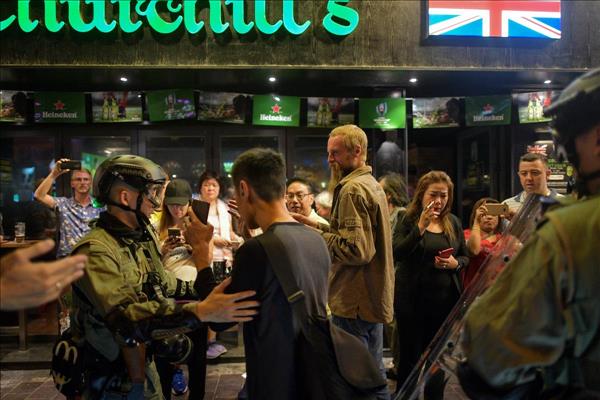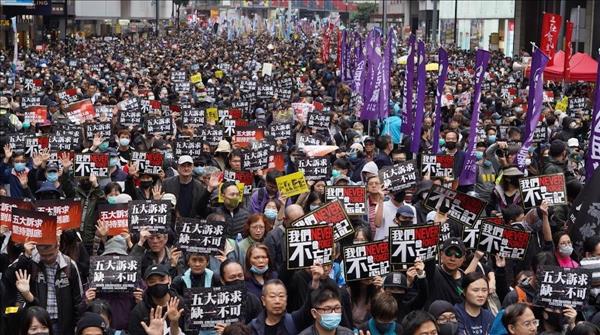(MENAFN- Asia Times) HONG KONG – Around 42% of expatriates are considering leaving Hong Kong, with most saying they are uncomfortable with the new national security law imposed by Beijing on the city, according to a survey conducted by the American Chamber of Commerce.
Between May 5 and 9, AmCham conducted a titled ''Should I stay or should I go?'' among 325 people, a quarter of its members. The survey showed that 58% of respondents had no plans to leave Hong Kong, while 42% said they were considering or planning to move away.
Of those who aim to leave, 62% said the National Security Law made them uncomfortable, while 49% said strict Covid-19 quarantines were also a contributing factor.
Around 42% said they were pessimistic about Hong Kong's future competitiveness and 36% had concerns about the quality of education for their children after the National Security Law was implemented.

Riot police in Wan Chai district, a touristic area where foreigners gather in bars, in Hong Kong on October 4, 2019. Photo: AFP/Nicolas Asfouri
Anti-foreigner sentiment
''I think the tolerance towards non-ethnic Chinese and Caucasians in particular, which was a hallmark of post-colonial Hong Kong, is waning. As to the National Security Law, it's not just that, but also the rise of illiberal values as Hong Kong becomes more closely integrated into China,'' said one respondent quoted in the survey.
Another said the National Security Law was destroying Hong Kong's international appeal. Yet another expat said he and his spouse were put off by an increase in anti-foreigner sentiment in the media and government statements, as well as reduced long-term career opportunities for foreigners in the city.
''Previously, I never had a worry about what I said or wrote when I was in Hong Kong. With the National Security Law, that has changed,'' said one expat. ''The red lines are vague and seem to be arbitrary. I don''t want to continue to fear saying or writing something that could unknowingly cause me to be arrested.''
About 52% of those who planned to leave Hong Kong said they would leave within a short time frame, or as soon as they could relocate. The remaining 48% said they would leave within three to five years. Some will move to Singapore, Tokyo, Bangkok, Seoul and Taipei, while others will return to their home countries, the survey's respondents said.
The city's high quality of life, excellent business environment and low crime rate are still attractive to those who have no plan to emigrate from Hong Kong, representing nearly 60% of the survey's respondents. These expats said national security was a norm in today's world.
AmCham said it strongly suggested that the government pay close heed to expats'' sentiment and work toward allaying concerns through a stronger understanding of Hong Kong's international talent, lest the city lose its competitiveness vis-a- vis other business hubs.
The Hong Kong government had taken the time to explain the importance of the National Security Law to the business community, and most people said they were grateful that the legislation had ''brought back stability'' to the territory following 2019's social unrest, Edward Yau, the Secretary for Commerce, said after attending a Legislative Council meeting on Wednesday.

Protesters march in Hong Kong on January 1, 2020. Photo: Yat Yeung / NurPhoto / AFP
''Different business entities would have different reasons to stay or otherwise, but I think figures also speak for themselves,'' he said, adding that the number of overseas firms with regional offices in Hong Kong has remained steady at about 9,000.
''We believe that business decisions would best be made by people who actually stay and operate in Hong Kong, and I also see from similar surveys that the majority of foreign firms still believe Hong Kong is the place for doing business, particularly with the opening up of opportunities,'' Yau said.
Rule of law
There have been widespread rumors about capital flight from Hong Kong over the past two years, but the financial reality is that there were net capital inflows of US$50 billion in the territory last year, Financial Secretary Paul Chan said in an online forum organized by the Asia Pacific Foundation of Canada.
The implementation of the National Security Law and the change in the electoral system had stabilized Hong Kong society and increased confidence for both local and foreign investors, Chan said.
He added that Hong Kong still had an advantage in its rule of law, judicial independence and free flow of information, talent and capital.

A woman poses for a photo in front of the Hong Kong City Skyline on, May 10, 2021. Photo: AFP/Vernon Yuen/NurPhoto
Contingency plans
''Financial talents, just like financial institutions, are attracted to opportunities,'' Eddie Yue, chief executive of the Hong Kong Monetary Authority, wrote in his earlier this year. ''Hong Kong's unique access to mainland opportunities and its vibrant fintech and sustainable finance scene provide an excellent launching pad for talents of all sorts.''
Yue added that all the intangible factors – connectivity, a laissez-faire environment, international flair, cosmopolitan society, cultural diversity – that make Hong Kong an evolving, thriving and welcoming city for global citizens to invest, work and live in, remained intact.
''We''re not hearing companies moving away, but they are reviewing contingency plans if in the future they may decide to move,'' Jeff Nankivell, the consul general of Canada in Hong Kong and Macau, told Hong Kong media last week.
Nankivell, who has lived in Hong Kong for five years and said he is going to leave the city, said many members of political parties and non-governmental organizations had become less willing to meet consuls-general after the National Security Law was implemented last year.
He said he had also become more cautious when talking to people as Hong Kong's situation was sensitive.
Indeed, not everybody feels safe and secure under the security law. Hong Kong journalist Sarah Liang, a reporter with the Epoch Times linked to the Falun Gong, a spiritual movement banned on the mainland, was attacked by a man wielding a baseball bat near her home in Ho Man Tin at about 11:30 am on Tuesday.
Liang, who is also president of the Hong Kong Association of Falun Gong, said the assailant jumped out of a black Mercedes-Benz and repeatedly hit her legs with the bat, causing .
The US State Department criticized the assault as ''unacceptable'' and urged a thorough investigation, as did the Hong Kong Journalists Association.
MENAFN12052021000159011032ID1102071243
Legal Disclaimer:
MENAFN provides the information “as is” without warranty of any kind. We do not accept any responsibility or liability for the accuracy, content, images, videos, licenses, completeness, legality, or reliability of the information contained in this article. If you have any complaints or copyright issues related to this article, kindly contact the provider above.